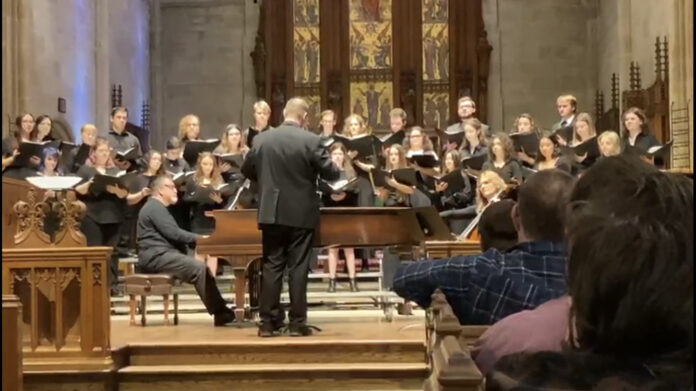On Oct. 23, the Muhlenberg Music Department presented a choir concert titled, “Exile, Refuge and Comfort.” The concert was compiled with works dedicated to and inspired by the refugee experience. The performance was meant to bring light to the refugee crisis and provide a sense of hope for those who have been displaced from their homelands.
The concert began with the Muhlenberg College Choir singing “Al naharot Bavel (Psalm 137)” composed by Salomone Rossi (c. 1570-1630). Rossi was an Italian Jewish composer during the late Italian Renaissance. Rossi had written collections of Jewish liturgical music which have been described as an unprecedented development in synagogal music. Rossi’s style of composition for Psalm 137 is homophonic, which allows for each part to be sung in the same syllable at the same time. This style allows for an easy understanding of the Psalm. The inclusion of this work is to highlight how the author of Psalm 137 might have been exiled after the fall of Jerusalem in 587 BCE and may have been one of the temple musicians that had been taken to Babylon for their entertainment. Psalm 137 was meant to bring encouragement and hope to the despondents of God after the city of Jerusalem was in ruins.
There were a number of works meant to highlight those who had found themselves displaced due to religious conflicts, as well as works that manifested during contemporary times, showing how exile and displacement from home can come in different fashions. The Muhlenberg Treble Choir sang “Wanting Memories,” composed by Ysaye M. Barnwell, who was a notable member and composer of the African American women’s a capella group, “Sweet Honey in the Rock.” She wrote this piece about loss and comfort after preparing to sell her parent’s house after their death. The song followed lyrics that reflected the sense of loss she felt, and how without her parents and without her home she was appreciative of the memories she held, and the lessons she was able to gain from a world she once knew to embark on a world that is unfamiliar to her after this loss.
The College Choir followed this piece with “I Dream a World: Chorale,” which was composed by Dave Brubeck and was a piece written by Langston Hughes, who is known best as the leader of the Harlem Renaissance. Hughes was an American activist, poet, playwright, novelist and was a creator of the literary form of jazz poetry. Hughes wrote this piece about holding out hope for a better world, with lyrics that show how he dreams of a world free of racial injustice, where people can exist peacefully, and find home wherever they please.
One of the last songs performed by the College Choir was “Same Train,” which was described as an African American spiritual arrangement by Alice Parker and Robert Shaw. It is a piece meant to reflect what is known in American history as “The Great Migration” which was one of the largest displacements of people in US history. The Great Migration forced six million African Americans to migrate from rural communities in the South to large cities in the north and west. African American spirituals are said to predate the time of the Great Migration and in its original form derived from how religion and faith were utilized among enslaved populations, and how it was used as a tool of communication and was meant to express their religious beliefs, daily lives and dreams. “Same Train” is an arrangement meant to not only speak through its lyrics, but the way in which the arrangement is sung is reflective of the sounds a train makes– to the point where one could hear the wheels rolling.
The concert was dedicated to highlighting refugee experiences, and how displacement comes in varying forms. On the program of the concert, there was a QR code for anyone who would like to donate to a community partner, the Refugee Community Center in Allentown. The proceeds of the weekend went to an emergency fund for refugees within the community. A moving and inspiring performance led people to become more informed on the refugee experience, and how we can contribute aid to those in need.
Jack Riccobono ‘25 said, “I thought the concert was beautiful and inspiring and displayed the importance of advocating for groups that are unable to advocate for themselves.”
The concert contained an array of pieces meant to showcase different communities of people who have been displaced, and it can be seen that the refugee crisis is vast enough that the ten choral works were unable to fully represent the scale of displaced people across the world.
Esther Klinger ‘25, a singer in the College Choir said, “I believe that the refugee crisis is extremely important to cover and I’m glad that the concert attempted to do that. However, especially in the songs that were sung by the College Choir, there was not a lot of variety among the cultures that were represented in each set. So, while I’m glad the concert chose to focus on the refugee crisis, I wish that a more diverse repertoire was chosen.”
Shinam ‘25 is a political science and sociology major at Muhlenberg. She is immensely excited to be apart of the Weekly staff! When she isn’t writing, she can be found reading a book or watching a comfort show with her favorite fast food!























